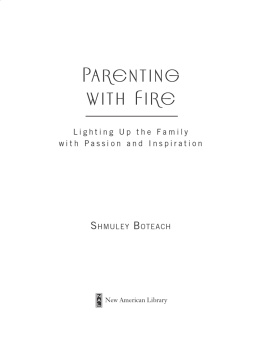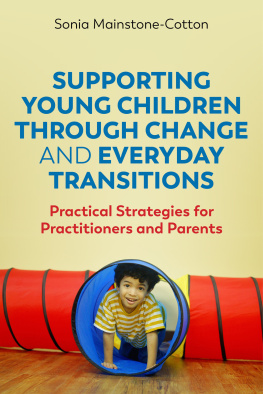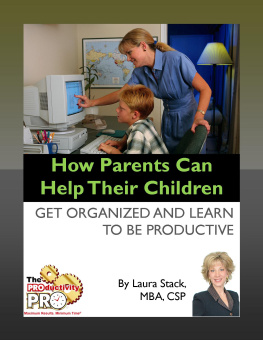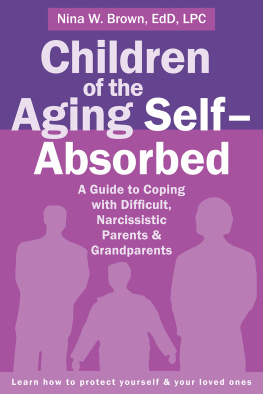C ONTENTS
Why cant I get my child to listen? Why do I have to repeat everything? Why does every conversation end in an argument?
The question becomes, Who, not what, do you want to be?
A person who was truly a child first, a person who experienced life as something wonderful and awe-inspiring, takes that with him into adulthood.
To me, the truly important question is this: Are you intellectually curious?
Every human being has value, and every human encounter is a fresh chance to let him know it.
Women nurture and enhance everything they come into contact with, men most of all.
A child needs to understand one of the basic truths about forgiveness: When we forgive, we are doing it first and foremost for ourselves.
Far too many families nowadays live together as strangers.
Love is the force in the universe that brings everything together; hate drives everything apart. Love is the gravity that unites us; hate the antigravity that rips us asunder.
A child who measures his self-worth through grades, popularity, and even his position on the Little League team will carry that into adulthood, and his entire life will be colored by skewed, fear-driven values.
The place of God in our life is to always remind us of the moral question. God demands righteousness.
W HY CAN T I GET MY CHILD TO LISTEN ?
W HY DO I HAVE TO REPEAT EVERYTHING ?
W HY DOES EVERY CONVERSATION
END IN AN ARGUMENT ?
I n my life as a family counselorand on my family and parenting TV show, Shalom in the Home I am approached constantly by parents looking for help with their children. It is a request I take very seriously; as a father of eight, I know how hard it can be to feel youve tried everything you can think of, to wonder whether youre being too indulgent or too harsh, too distant or too intrusive. Some parents are convinced that theres something wrong with them; others worry that theres something wrong with their kids. I remember one couple who joked, painfully, about their devil daughtera child who opted to do wrong at every turn.
This book is based on two fundamental ideas. The first is that there are no bad children and no deliberately bad parentsbut that sometimes, despite the best of intentions on both sides, there can be really bad relationships between parents and their children. The second is that, as parents, we must do everything we can to save those relationships, to reach out and communicate with our children. Because it is only by talking to themreally talking to themthat we can create an environment of inspiration and change.
That, then, is the purpose of this book: to inspire parents to find creative ways to communicate with their increasingly uncommunicative kids.
That is our fundamental job as parentsto take our children to the mountaintop; to become a source of knowledge, guidance, and inspiration; to help our children craft, shape, and mold their own charactersyet it remains the most neglected aspect of parenting. To the extent that we do speak to our kids at all, its usually limited to set-piece conversations about the birds and the bees, say, or about the perils of drug abuse, and while those conversations are, of course, important, their limited repertoire would hardly constitute a real dialogue with our kids.
Parents always ask me, Why cant I get my child to listen? Why do I have to repeat everything? Why does every conversation end in an argument? And my answer is simple: You are taking the wrong approach.
The job of the parent is not to impose his or her will on the child, but to get the child to listen to his or her own inner voice. Inspiration, not just prescription.
I can trace the idea for this book back to my long-ago days as a camp counselor, when I discovered that my principal function was to inspire the kids under my care. I soon realized that if I failed to find an outlet for their creative energies they would get into all sorts of mischief. Since I didnt want to spend my days playing traffic cop and peacekeeper, which is entirely reactionary and utterly lacking in inspiration, I tried to find creative ways to engage them. With a little workchallenging hikes, unusual games, unique adventuresI not only managed to keep them out of trouble, but to engage their minds, to make them come alive.
The Talmud says: Idleness breeds sinfulness. When you have nothing to do, you do what you ought not to do. Well, the Talmud is right.
That same approach can be applied to parenting. The parent who inspires his or her children is generally the most successful parent. But how does one inspire a child, especially in this day and age, when we hardly have enough time for ourselves? Inspiring people, lifting them up, is hard work, and it seems to require great storehouses of energy. Then again, perhaps it isnt as difficult as it appears. You might start by taking a closer look at yourself and your own values. When I did that, I had to come to terms with the fact that I was largely illiterate of the cultural arts, and that I would be unable to teach my children much about music, dance, opera, or ballet. On the other hand, there were many things I did know about, and I exposed my children to those: love of God, love of reading, love of history, love of nature, love of people, love of family. In sharing these passions with my kids, I may not have produced perfect children, but I can assure you that they dont lack for inspiration, and that they are rarely ever bored.
That alone has freed me from being a reactive parent, which seems to be the norm in most households these days. Your kid is drawing on the wall, you grab the crayons and stop him. Watching too much TV? You angrily turn off the set. Doesnt want to go bed? You raise your voice and send him running. Alas, that approach is fundamentally flawed. If you focus solely on crafting and shaping and molding your children, you will raise kids who are trying to become what they think Mom and Dad want them to become, not what they themselves would like to be. Or, worse, youll raise angry young rebels. But if you stop being so reactionary, and if you take the time to be proactive, you can teach the child to find his own way, and to listen to his own, unique, inner voice.
That is the purpose of these 10 Conversations: to help you put your child in touch with his own heart so that he will be prepared for the all-important questions: What kind of person do I want to be? Do I want to be a good person or a bad person? Do I want to be selfless or selfish? Will I bring light into the world, or will I compound its darkness? Will I live life in the shallows, or will I engage its mysteries and plumb its depths?
In a phrase, these conversations are about becoming a person.
In the book of Psalms (127), David describes the parent as a quiver and the child as an arrow. Long after the arrow has left the bow, its trajectory is shaped by the bow. Have you imparted to your child the inspiration that will have him traveling along a righteous path? Have you given your child the tools he needs to face the world? Are you fulfilling your role as a source of guidance and inspiration? Are your kids turning into the kinds of kids you hoped they would become?
When people meet my kids, they always tell me how nice they are, but my kids are not nice in a boring, goody-two-shoes sense. They argue, fight among themselves, and sometimes get reprimanded by teachers for not working hard enough at school. On the other hand, they do have a certain maturity that many kids lack, and this is what people notice about them. When we have large groups of guests for dinner, which we do almost every Friday night for the Jewish Sabbath, my kids will sit at the table and actively engage the adults in conversation. They do so because they are genuinely interested in hearing what people have to say and have already, at an early age, formed strong opinions on a plethora of subjects, and Id like to think that my wife and I had a little something to do with this. We have tried to teach our children to be curious about people and about life, to ask questions, to probe deeper. In short, we have tried to inspire in them a hunger for livingfor the sheer mystery of being alive. And weve done this by talking to our kids, really talking to them.








